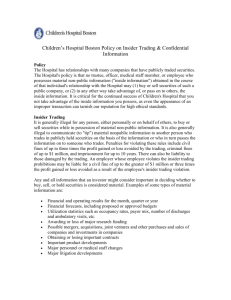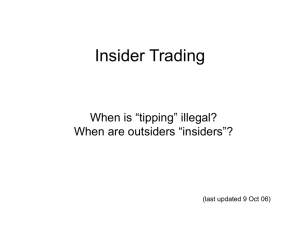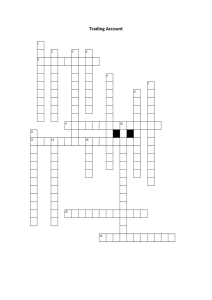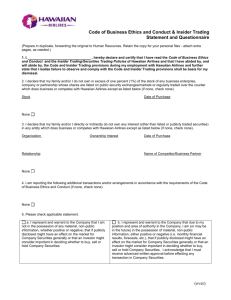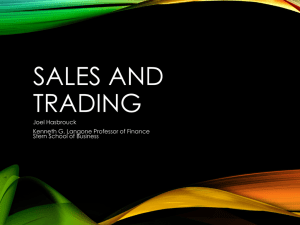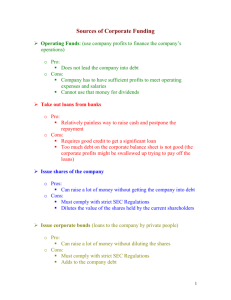Document
advertisement
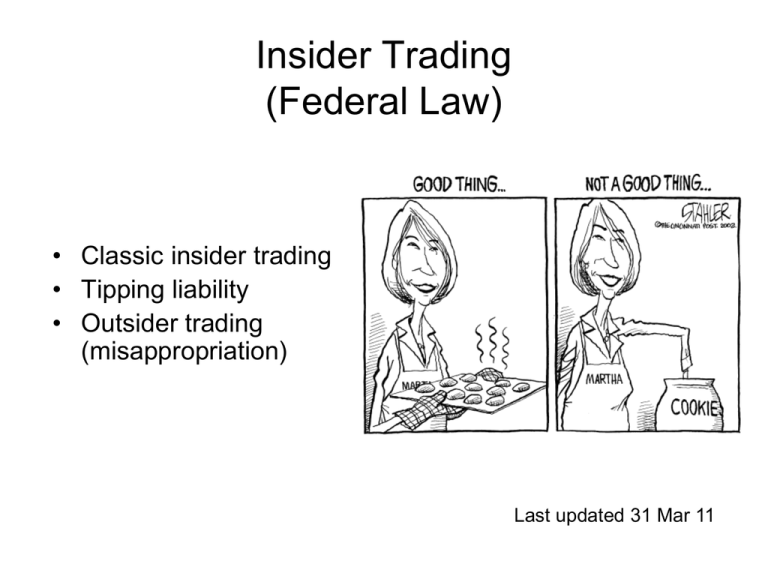
Insider Trading (Federal Law) • Classic insider trading • Tipping liability • Outsider trading (misappropriation) Last updated 31 Mar 11 Classic Insider Trading Misappropriation (Outsider Trading) Company shareholders Outside shareholders Silence = fraud Violates duty (duty of trust/confidence) to source (1) Tip violates duty * (2) Knows / reason to know * improper benefit INSIDER 10b5-2 • Confidentiality agreement • Confidentiality practice • Family member – functional Tippee Rule 10b5-1: state of mind when trading “on the Tippee basis” of material, nonpublic information • “aware” (“conscious knowledge”) • Pre-existing trading plans Rule 10b-5 Securities Exchange Act of 1934 Act § 10 It shall be unlawful for any person ... (b) To use or employ, in connection with the purchase or sale of any security ... any manipulative or deceptive device or contrivance in contravention of such rules and regulations as the Commission may prescribe Fraud (tort of deceit) • Material misrepresentation • Intentional (defendant aware of truth) • Reliance (plaintiff relies reasonably) • Misrepresentation is cause of loss • Damages Rule 10b-5 Securities Exchange Act of 1934 Act § 10 It shall be unlawful for any person ... (b) To use or employ, in connection with the purchase or sale of any security ... any manipulative or deceptive device or contrivance in contravention of such rules and regulations as the Commission may prescribe Fraud (tort of deceit) • Material misrepresentation Fraud (tort of deceit) • Intentional aware • Material(defendant misrepresentation of• truth) Intentional (defendant aware(plaintiff of truth) relies • Reliance • Reliance (plaintiff relies reasonably) reasonably) • Misrepresentation is cause of • Misrepresentation is cause loss of loss • Damages • Damages Classic insider trading … Cady Roberts (SEC 1961) “Classic” Investors / shareholders Sell to new investors (sell short) Gintel (director) Curtiss-Wright Non-public, material information (board votes to cut dividends) Duty to abstain or disclose … Chiarella v. US (US 1980) “Outsider” shareholders Pandick Press Chiarella Shareholders Insider Acquiror Inc Target Company Non-public, material info (takeover plans) Chiarella v. US (US 1980) "... silence in connection with the purchase or sale of securities may operate as fraud actionable under § 10(b) ... But such liability is premised upon a duty to disclose arising from a relationship of trust and confidence between parties to a transaction.” Justice Lewis Powell Tipping liability … Dirks v. SEC (US 1983) “Tipping” Investors / shareholders Clients dump stock Secrist Dirks (analyst) Equity Funding Non-public, material information (massive accounting fraud) Dirks v. SEC (US 1983) ... a tippee assumes a fiduciary duty to the shareholders of a corporation not to trade on material nonpublic information only when the insider has breached his fiduciary duty to the shareholders by disclosing the information to the tippee and the tippee knows or should know that there has been a breach. Whether the "tip" was a breach of the insider's fiduciary duty [depends on] whether ... the insider receives a direct or indirect personal benefit that will translate into future earnings. Justice Lewis Powell Hypothetical “Tipping” Investors / shareholders Sell Stock Spouse Secrest Equity Funding Non-public, material information Massive accounting fraud) Martha Stewart … SEC v. Stewart (settled 2006) “Tipping” Stock market Sells stock Martha Stewart (at airport) Sam Wachtal (CEO) Imclone Faneuil (ass’t) Non-public, material information (FDA likely to disapprove drug) Outsider Trading … (Misappropriation) US v. O’Hagan (US 1997) “Misappropriation” Shareholders Option sellers Dorsey & Whitney Buy, buy, buy O’Hagan Insider Shareholders Pillsbury Grand Met Non-public, material info (plan to make tender offer To Pillsbury shareholders) US v. O’Hagan (US 1997) The "misappropriation theory" holds that a person commits fraud "in connection with" a securities transaction, and thereby violates § 10(b) and Rule 10b-5, when he misappropriates confidential information for securities trading purposes, in breach of a duty owed to the source of the information. … Under this theory, a fiduciary's undisclosed, self- serving use of a principal's information to purchase or sell securities, in breach of a duty of loyalty and confidentiality, defrauds the principal of the exclusive use of that information. Justice Ruth Bader Ginsberg US v. O’Hagan (US 1997) [The "in connection with the purchase or sale of [a] security"] element is satisfied because the fiduciary's fraud is consummated, not when the fiduciary gains the confidential information, but when, without disclosure to his principal, he uses the information to purchase or sell securities. … This is so even though the person or entity defrauded is not the other party to the trade, but is, instead, the source of the nonpublic information. Justice Ruth Bader Ginsberg US law of insider trading … Classic insider trading: • Fraudulent silence under Section 10(b) • duty of trust or confidence to “abstain or disclose” Tipping liability: • know or should know that • tipper has breached duty for improper personal benefit Misappropriation liability: • Fraud on source “in connection with” securities trading • Maintain integrity of securities markets Classic insider trading: • Fraudulent silence under Section 10(b) • duty of trust or confidence to “abstain or disclose” Tipping liability: • know or should know that • tipper has breached duty for improper personal benefit Misappropriation liability: • Fraud on source “in connection with” securities trading • Maintain integrity of securities markets Classic insider trading: • Fraudulent silence under Section 10(b) • duty of trust or confidence to “abstain or disclose” Tipping liability: • know or should know that • tipper has breached duty for improper personal benefit Misappropriation liability: • Fraud on source “in connection with” securities trading • Maintain integrity of securities markets SEC rulemaking role … Effect of SEC rules • Rule 10b5-1: state of mind when trading “on the basis” of material, nonpublic information – “aware” (“conscious knowledge”) – Pre-existing trading plans • Rule 10b5-2: duty to source in business/personal relations – Agree to maintain confidentiality – Practice of sharing known confidences – Spouse, parent, child, sibling – unless no confidentiality • Regulation FD: no special access for analysts
